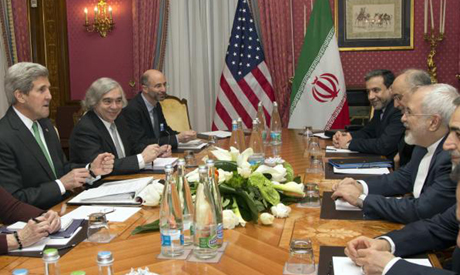
US Secretary of State John Kerry (L) holds a meeting with Iran's Foreign Minister Javad Zarif (R) over Iran's nuclear program in Lausanne March 17, 2015 (Photo: Reuters)
US Secretary of State John Kerry and his Iranian counterpart sought Tuesday to make progress in tortuous negotiations as the clock ticked down on reaching an elusive deal on Tehran's disputed nuclear programme.
A March 31 deadline loomed over Kerry and Mohammad Javad Zarif as they sat down for a second day of talks on Tuesday, trying to agree the outlines of a deal that would bury any prospect that Iran might develop atomic weapons.
They hope that such an accord, which is meant to be finalised by July, would end a decade-plus standoff over the issue, with the West fearing that Iran is trying to develop nuclear weapons under the guise of a civilian programme, and Tehran denying the charge.
On Monday, after Kerry, Zarif and others met for almost five hours in the lakeside Swiss city of Lausanne, a senior US official involved said that it remained uncertain whether the deal can be clinched.
"Iran still needs to make some very tough and necessary choices to address the significant concerns that remain about its nuclear programme," the official said on condition of anonymity.
"We're trying to get there. But quite frankly, we still do not know if we will be able to," the official said, likening the months of negotiations to a "rollercoaster".
After Monday's meeting Zarif travelled to and from Brussels -- while Kerry went for a bike ride -- to meet European foreign ministers and EU foreign policy chief Federica Mogherini.
Political directors from the other five powers involved -- Russia, China, Britain, France and Germany -- are expected in Lausanne in the coming days, some as early as Tuesday.
The six powers want Iran to scale down its nuclear activities in order to extend the time Tehran would in theory need to make enough nuclear material for a bomb.
Critics in the United States and in Iran's arch foe Israel, widely assumed to have nuclear weapons itself, fear that the restrictions being proposed won't go far enough.
In Washington a political storm is raging with 47 Republican senators last week writing to Iran's leaders telling them that Congress could alter any deal and that a future president could tear it up.
US President Barack Obama, a Democrat, is also fighting to stop the Republicans bringing new legislation that would force him to submit any deal to Congress for approval.
"Apparently the administration is on the cusp of entering into a very bad deal with one of the worst regimes in the world that would allow them to continue to have their nuclear infrastructure," Senate Majority Leader Mitch McConnell told CNN on Sunday.
Two deadlines to get a deal in July and November were missed but neither side, particularly the Obama administration, can afford to extend yet again.
What might emerge in Lausanne by the end of the month -- or possibly this week -- is unclear, but a "concrete understanding" is crucial, expert Ali Vaez from the International Crisis Group told AFP.
The senior US official said that it remains unclear what form this "political framework", assuming it can be done by the end of the month, will take.
"How detailed that will be and how -- what form it will take is not yet decided because we aren't there," she said.
Officials on both sides say that some progress has been made in what would be a highly complex agreement, but that crucial gaps remain.
These include the scale of Iran's uranium enrichment capacities -- which can make nuclear fuel but also the core of a bomb -- the accord's duration and pace at which sanctions on Iran would be lifted.
"We need clarity on the way in which sanctions will be lifted and what the guarantees will be for applying the deal," Zarif said Sunday.
"There have been advances but there are still important points which have not been resolved and we will see if we can move forward," French Foreign Minister Laurent Fabius said Monday.
Short link: